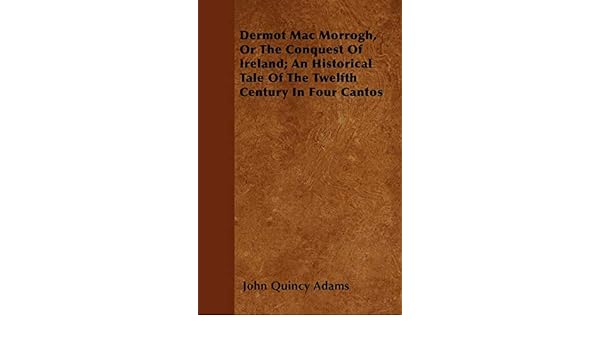Now, this is news to we readers in 2020 as well, since the Library of America Diaries have not told us that JQ actually submitted Dermot Mac Morragh, or The Conquest of Ireland,* for publication (or as he'd referred to it at the start of the year as "The Tale of Dermot". But submitted he had, though I do not know any more about that than it went, evidently, to Melvin Lord, "Boston Booksellers, 1650-1860." This bit of information I gleaned from here.
______
Washington, D.C.2 - December 1832
I answered the letter yesterday received from W. L. Stone, and one received this morning from Melvin Lord at Boston. He says that his edition of the Poem of Dermot is all gone -- That he has no copies left -- This has relieved me from much anxiety -- The puck [sic] of critics are just opening upon it; and if they now destroy it de fond en comble they cannot injure the publisher -- My Shoulders must bear -- I comfort myself with the reflection that Jeffrey in the Edinburgh Review pronounced Byron a Poetaster, and Byron in his English Bards and Scotch Reviewers deals out the same measure to Walter Scott -- I remember too that Byron was dissuaded by a friend from pubishing his Childe Harold, and Scott from finishing his Waverley. A Poem is at best but a Lottery ticket and if I get a prize barely to repay me the price of my ticket, I must put with it for good luck -- Snow.
Alas, it seems he foretold correctly -- Dermot did not garner laudatory reviews:
Indeed, it is that short sentence of four words,–By John Quincy Adams,–to which Dermot Mac Morrogh will be solely indebted for all the attention it will receive. Were it not for this magic sentence, we doubt if many readers would get further than the middle of the first Canto; and we are quite certain that none would ever reach the end of the second.I am still continuing with the 2019 biography of James Monroe. As I'm now into his administration and JQ has finally arrived back in the US from his appointment as minister to London, to take up his cabinet post as Secretary of State -- these two books are dovetailing seamlessly. Sometimes I forget from which one I heard a juicy bit. Both are read aloud experiences, JQ with the two of us at bedtime, and the James Monroe from an NYPL audio download to which I listen while working out.
Learning that John Quincy was determined to commit historical fiction is heart-warming, being as good historical fiction was always my own childhood ambition. This is who the historical Dermot was.
However one gets to know him and his life, John Quincy Adams is worth knowing; and, he becomes more worthy the longer he lives.This cannot be said about most of us. And certainly not about our own Diaries!
~~~~~~~~~~
* Dermot Mac Morrogh, or the Conquest of Ireland: An Historical Tale of the Twelfth Century, in Four Cantos by John Quincy Adams (Classic Reprint) is available from Amazilla here. For some reason this delights me no end! There are even reviews, one of which pronounces Dermot an easy read.
Dermot's full text can be found at this University of Michigan website. As well as the poetry, it begins with JQ's own inevitably prolix Introduction and Description (soon after arriving to take up his post as Secretary of State, it was Congressional Recess. President Monroe had gone to his Virginia farm for R&R - he wasn't well. Within two weeks, Adams had drowned him in at least ten multiple-page letters from D.C., about everything.


No comments:
Post a Comment